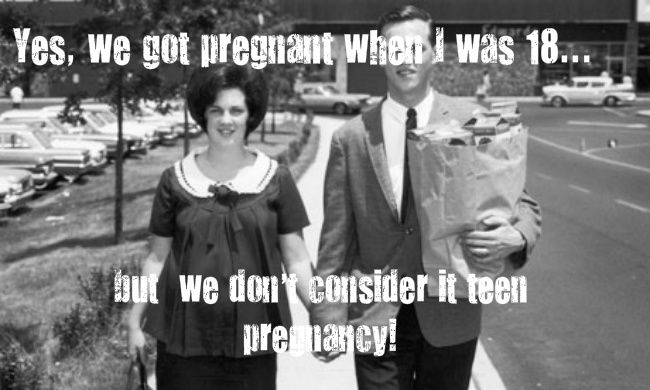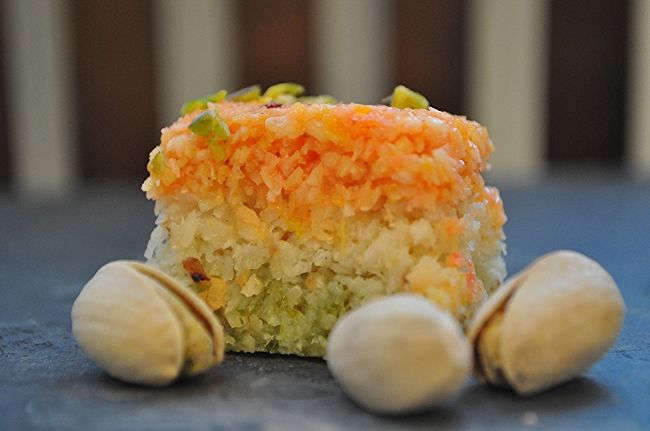
India has been on my mind lately. We're right in the middle of one of the biggest festivals of the year: the ten-day Ganapati festival. Millions of Indians across the world will be visiting one another in homes to pay homage to elaborate arrangements surrounding the idol of Ganesh, the god of auspiciousness, the remover of obstacles. Dictated by the lunar calendar, this festival usually hits during monsoons in India, and I remember getting soaked to the bone hopping from one home to the other as we made our way through taking darshan (literally, sight) of relatives and friends' Ganapati. The host would welcome us, give us some prasad (literally, a gracious gift), which was always in the form of a sweet, we'd stay for some pleasantries, and then we'd put our sopping sandals back on and be on our way to the next stop. Morning to evening, for ten days.
We're celebrating out at my folks' place this weekend, and I wanted to bring some sweets to share. I started out with plans to make a couple of different burfis, an Indian equivalent of fudge. I planned on coconut and pistachio, two popular and personal favorites. But the best laid plans... well, let's just say that burfi is a very forgiving dessert. And since India's flag is such a simple triad of colors, it can make for a very nationalistic one as well.
Coconut and Pistachio Burfi
- 4-5 cups of unsweetened shredded coconut
- 2 14 oz. cans of sweetened condensed milk
- 1/4 tsp. ground cardamom
- 1 cup shelled pistachios, plus a handful reserved to crush for garnish
- pat of butter, for greasing the pan
Blanch the shelled pistachios by immersing in boiling water for two minutes; then just rub between your fingers to remove the remaining peels.
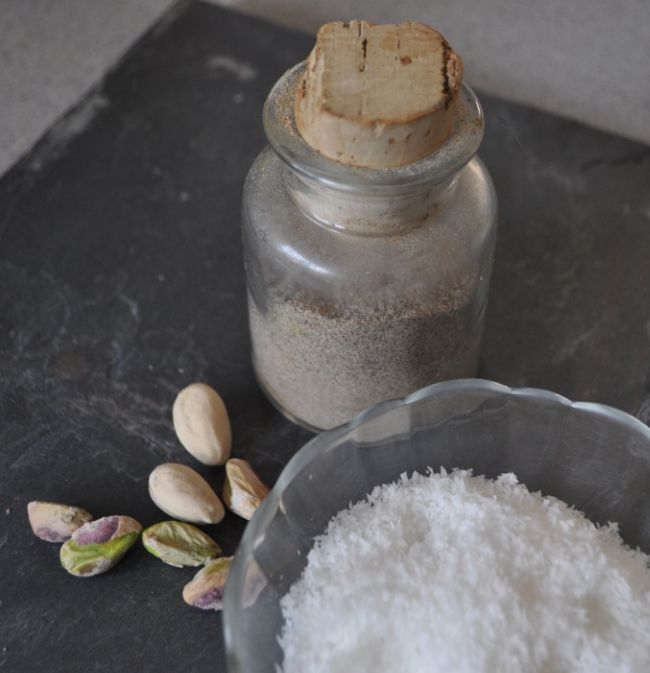
Grind into a paste, using some water if necessary.
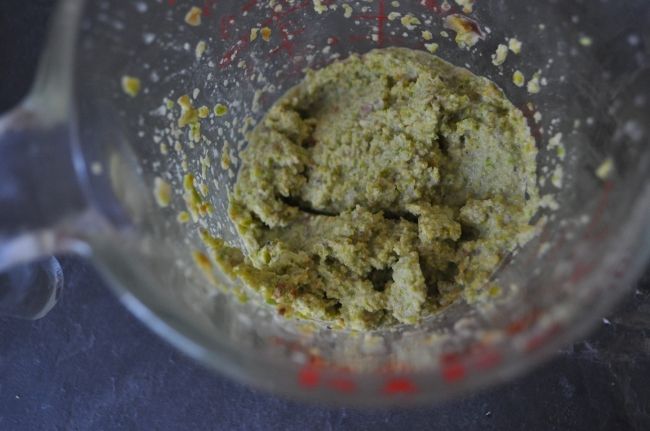
In one pot, dry roast the coconut until it is fragrant (do not allow it to become brown). Remove one cup and add to another pot, with the pistachio paste. Add one can of the condensed milk to the coconut-only pot, and stir continuously over medium heat until the mixture begins to incorporate the milk and the coconut becomes clumpy and less sticky. Add the ground cardamom. Remove from heat. Repeat with the coconut-pistachio mixture in the other pot with the second can of condensed milk, sans cardamom.
Layer the pistachio burfi on the bottom of the greased pan and pack it in tight.

Next, divide the coconut-only batch into two halves. Now, if you have saffron, you're a better person than I am and you should soak a bit in some warm water and add the essence to one half of the coconut-only mixture until you reach the desired flag-orange color. If you don't, use some food coloring--I won't tell.
Layer the white mixture on top of the green.

And top it off with the orange mixture, remembering to pack both layers tightly. Finally, crush some pistachios for garnish and press onto the orange layer.
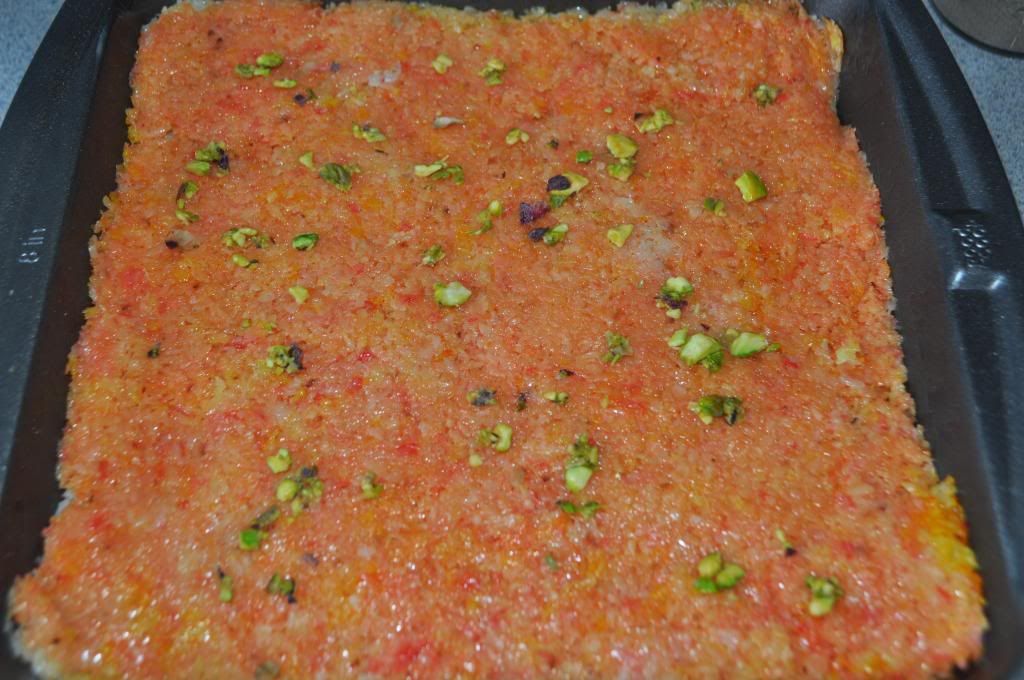
Chill this pan in the fridge for at least one hour, then use a greased butter knife to slice.

Why else is India on my mind? The four defendants in the brutal New Delhi gang rape case have been on trial, which ended with a guilty verdict, followed by today's sentencing condemning them to death by hanging. It's difficult to read about the gleeful reactions to the verdict--not because even any small part of me thinks these monsters deserve life, but because these episodes offer relief in the form of temporary moments of vindictive vengeance. They distract from the larger problem of violence against women and the institutional and societal failures that allow women to continue to be vulnerable to such heinous behavior. And, after all, they're unlikely to even die this way. There are 477 people on death row in India, yet only three have been executed in the last nine years, due to an appeals process that can travel up several levels of bureaucracy and a severely backlogged justice system.
I would like to think that the public outcry in response to this case will not end here, with this symbolic sentence. I would like to think that the bodies that poured into the streets after the brutal rape will continue to band together, to say such violence against women has always been and continues to be one of the fundamental flaws of human societies. I would like to see millions of Indians take to the streets again, saying that this doesn't end with this verdict and sentence.
Millions of Indians in the streets? That's actually not hard. Particularly during Ganapati because the ten days culminate in public processions through the streets that march to the water and immerse their family idols in the sea. Not the most environmentally sound tradition, I know, and I have family members who are starting to refrain from this practice (our NoVa version included), but it does bring millions of Indians out into those streets.
One of India's greatest freedom fighters, Bal Gangadhar Tilak, actually gave the festival a distinctly political face in the late 1800s. He brought families into the streets for this procession, who until then had celebrated Ganesh in privacy of their homes, and made Ganapati a public vehicle for protest against British colonial reign.
Wouldn't it be something if millions of Indians took the tenth day this year, next Wednesday the 18th, to march on our behalf and demand that obstacles be removed for the women of India, and, let's face it, the world. That's assuming that you, like me, don't agree that patriarchy is dead.

